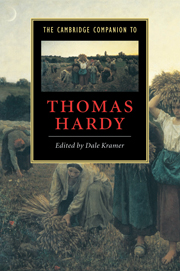Book contents
- Frontmatter
- 1 Thomas Hardy
- 2 Wessex
- 3 Art and aesthetics
- 4 The influence of religion, science, and philosophy on Hardy's writings
- 5 Hardy and critical theory
- 6 Thomas Hardy and matters of gender
- 7 Variants on genre
- 8 The patriarchy of class
- 9 The radical aesthetic of Tess of the d'Urbervilles
- 10 Hardy and readers
- 11 Hardy as a nineteenth-century poet
- 12 The modernity of Thomas Hardy's poetry
- Index
2 - Wessex
Published online by Cambridge University Press: 28 May 2006
- Frontmatter
- 1 Thomas Hardy
- 2 Wessex
- 3 Art and aesthetics
- 4 The influence of religion, science, and philosophy on Hardy's writings
- 5 Hardy and critical theory
- 6 Thomas Hardy and matters of gender
- 7 Variants on genre
- 8 The patriarchy of class
- 9 The radical aesthetic of Tess of the d'Urbervilles
- 10 Hardy and readers
- 11 Hardy as a nineteenth-century poet
- 12 The modernity of Thomas Hardy's poetry
- Index
Summary
The word Wessex was, until the last quarter of the nineteenth century, a purely historical term defining the south-western region of the island of Britain that had been ruled by the West Saxons in the early Middle Ages. But since Hardy unearthed the word and used it in his novels and poems, it has come to mean to more and more people a district - to some degree coterminous with the Saxon kingdom - populated by characters sprung from the novelist's imagination. Indeed, Wessex has come to mean the whole culture - predominantly rural and pre-industrial - found in Hardy's novels and poems. So powerful and widely disseminated has been Hardy's imaginative creation that even during his lifetime, Wessex was being used once again in the traffic of everyday life to denote a region of vague extent in south-western England. Now, at the end of the twentieth century, a glance at a directory to any town to the south and west of Oxford will probably throw up a business or two with Wessex in its name; and this is Hardy's doing.
Wessex as Hardy left it for his readers when he died in 1928 has been the subject of many illuminating critical and descriptive studies, made from a range of points of view. But there is one fundamental truth about Wessex that has scarcely been recognized, nor have its implications been considered: it is that the complex social and environmental organization that readers and critics think of as Hardy’s Wessex did not exist in the novelist’s imagination when he first began to write, and, as this chapter sets out to show, did not exist in anything like the form we are now accustomed to, until the writing of his last three novels, and more particularly until the publication of the first collected edition of his work in 1895-96.
- Type
- Chapter
- Information
- The Cambridge Companion to Thomas Hardy , pp. 19 - 37Publisher: Cambridge University PressPrint publication year: 1999
- 6
- Cited by



